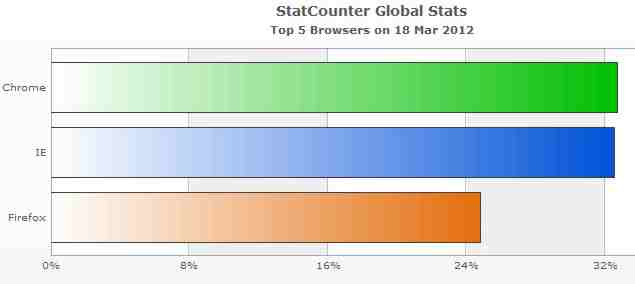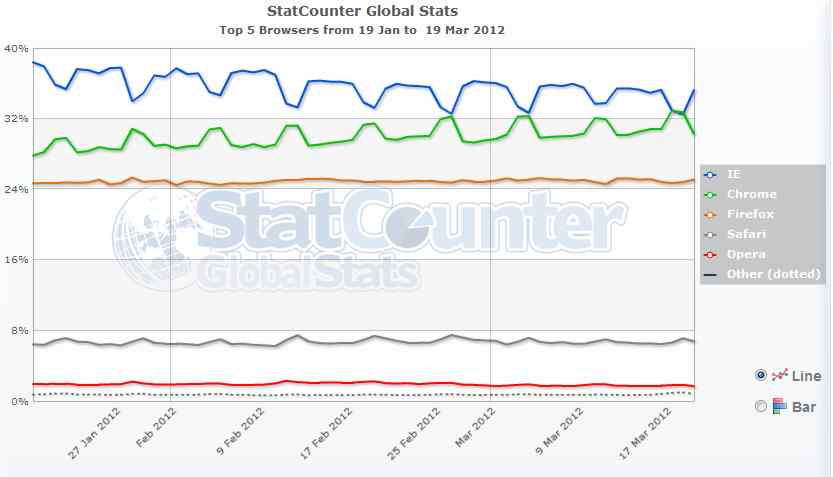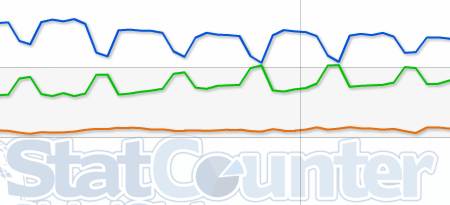| Did Chrome Overtake IE? |
| Written by Janet Swift | |||
| Friday, 23 March 2012 | |||
|
According to StatCounter, Google's Chrome browser overtook Microsoft's IE last weekend. Microsoft was quick to point out the flaws in the methodology that invalidated this result. But has StatCounter revealed an interesting pattern? StatCounter, which collects data from its network of more than 3 million websites, is keen to see Chrome achieve the status of top browser. Last December we reported Chrome 15 - World's Most Popular Browser when, according to StatCounter's figures, Chrome 15 had 23.6% of the worldwide market compared to IE 8 at 23.5%. Last week StatCounter issued a press release with the news that Chrome had briefly became the top browser worldwide on Sunday 18 March. Digging down to the underlying stats, Chrome had a 32.71% share of global browser usage and IE had 32.5%.
Also on Sunday 18 Roger Capriotti posted an item on the Exploring IE blog with the title Understanding Browser Usage Share Data in which he pointed out the overall share numbers provided by the two alternative sources of browser statistics, Net Applications and StatCounter, differ significantly and that this is explained by their different methodologies. Microsoft's preference is for Net Applications and Capriotti provides two reasons for this. One is the "geoweighting" which Net Applications employs to balance its global data and the other is that, since last month, Net Applications has also made an adjustment for Chrome "pre-rendering," This practice, in which the browser preloads websites that it believes the user will want to visit next in a bid to appear to work more quickly, skews the usage stats, making it appear as if Chrome is being used more than it really is. Both of these seem valid points and we've noted previously that discrepancies between the two sources means you can't read much into small changes in market share statistics. However the chart that StatCounter produced for the two months prior to the milestone event on 18 March does show a phenomenon that cannot be explained away so easily.
(click in chart to enlarge)
The chart shows a regular pattern with peaks for Chrome usage coinciding with troughs for IE usage every weekend. The explanation, according to Aodhan Cullen, StatCounter's CEO is that: "At weekends, when people are free to choose what browser to use, many of them are selecting Chrome in preference to IE". The idea that IE is the browser for business while Chrome is preferred for fun and games at home seems a reasonable one. It could also be that businesses tend not to change their browser as often as home users feel free to. Hence when at work the user is forced to use IE but when at home with a free choice the user downloads Chrome. If this is the case then the future doesn't look as good for IE. Interestingly Firefox use, which is lower overall at shows no marked cyclical behaviour and remains at a fairly steady 25% whatever day of the week it is.
More InformationChrome is world's number one browser for a day Understanding Browser Usage Share Data Related ArticlesChrome 15 - World's Most Popular Browser A Change of Direction in the Race for Browser Market Share?
Comments
or email your comment to: comments@i-programmer.info
To be informed about new articles on I Programmer, subscribe to the RSS feed, follow us on Google+, Twitter, Linkedin or Facebook or sign up for our weekly newsletter.
|
|||
| Last Updated ( Friday, 23 March 2012 ) |





